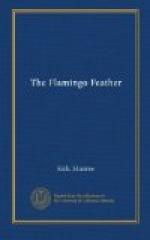Immediately after his overthrow of Chitta, and while the shouts of joy over his victory were still ringing in his ears, Has-se was led to an elevated seat, where he could be seen of all the people, and a bowl of the awful mixture was handed him. Without hesitation, and with a proud glance around him, the brave youth swallowed the nauseous draught, and then folding his arms, gazed with a smiling face upon the assembled multitude. For fifteen minutes he sat there amid a death-like silence, calm and unmoved, though the great beads of perspiration rolling from his forehead showed what he was enduring. At the end of that time a great shout from the people told him that his ordeal was over; and, weak and faint, he was led away to a place where he might recover in quiet from the effects of his terrible sufferings, and enjoy in peace the first glorious thoughts that now he was indeed a Bow-bearer and a warrior.
Rene sprang forward from his seat to seize and shake his friend’s hand, while from all, Indians as well as whites, arose shouts of joy at the victory of the brave and much-loved lad who wore the Flamingo Feather.
As the angry Chitta turned away from the scene of his defeat, his heart was filled with rage at these shouts, and he muttered a deep threat of vengeance upon all who uttered them, those of his own race as well as the pale-faces.
CHAPTER III
CHITTA’S REVENGE
So Has-se the Sunbeam became Bow-bearer to his father, the great chief Micco, and Chitta the Snake was disappointed of his ambition. By some means he became convinced that Rene de Veaux had instructed Has-se in his newly acquired trick of wrestling; and though he had no proof of this, he conceived a bitter hatred against the white lad. He had especially included him in his muttered threat of vengeance against all those who greeted his final overthrow with shouts of joy; but, like the wily reptile whose name he bore, he was content to bide his time and await his opportunity to strike a deadly blow. After the games were ended he disappeared, and was seen no more that day.
His absence was hardly noted, for immediately after Has-se’s victory the entire assembly repaired to the great mound which had gradually been raised by the accumulation of shells, bones, broken pottery, and charred wood that many generations of Indian feasters had left behind them, and here was spread the feast of the day. Then followed dancing and singing, which were continued far into the night.
At length the dancers became exhausted; the men who beat the drums and rattled the terrapin shells filled with dried palmetto berries grew so drowsy that their music sounded fainter and fainter, until it finally ceased altogether, and by two hours after midnight the whole encampment was buried in profound slumber. Even those whose duty it was to stand guard dozed at their posts, and the silence of the night was only broken by the occasional hootings of Hup-pe (the great owl).




